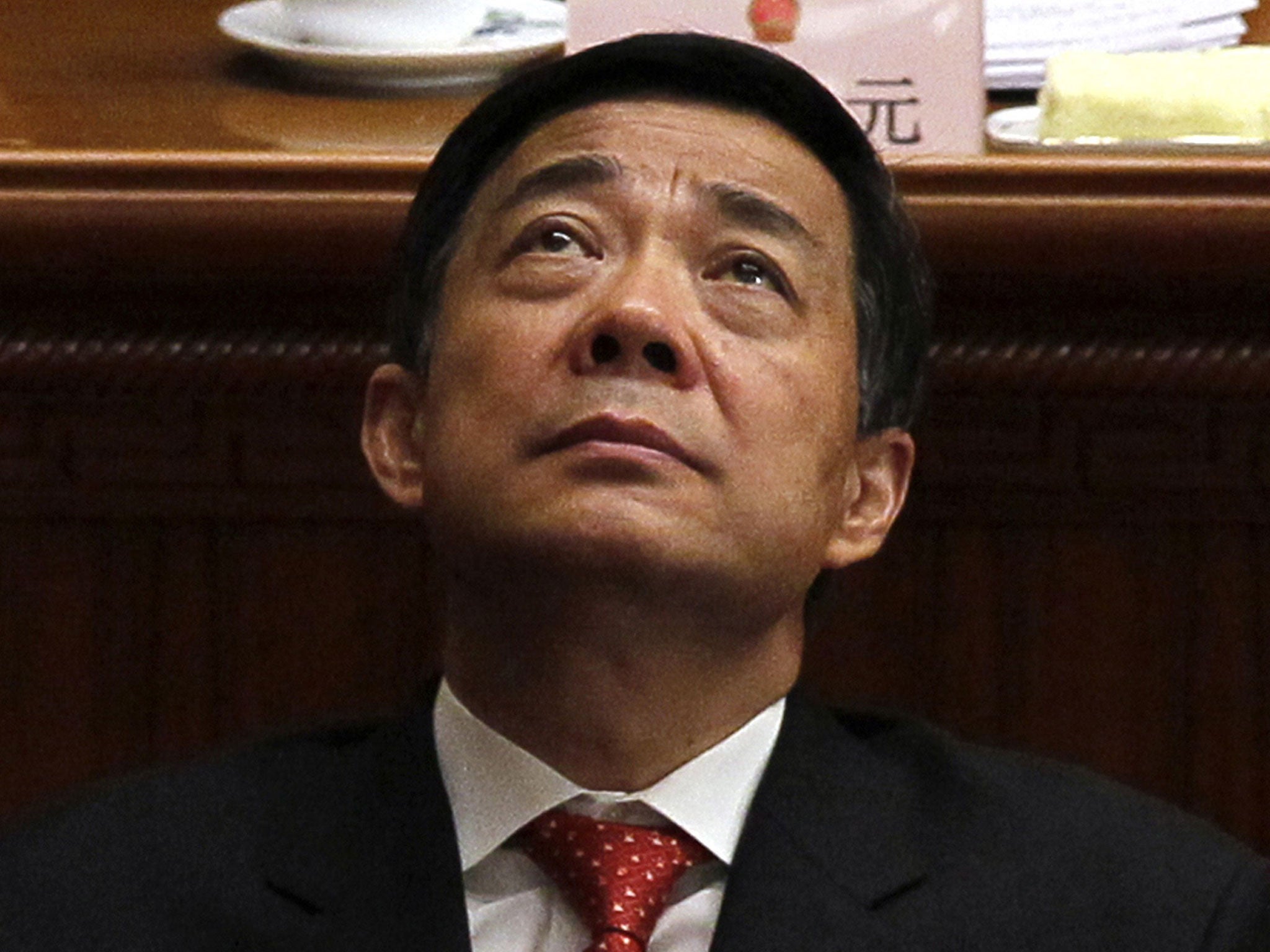Bo Xilai 'goes on hunger strike' as corruption probe drags on
With no charges and no trial date, the disgraced Chinese leader protests against unfair treatment

Your support helps us to tell the story
From reproductive rights to climate change to Big Tech, The Independent is on the ground when the story is developing. Whether it's investigating the financials of Elon Musk's pro-Trump PAC or producing our latest documentary, 'The A Word', which shines a light on the American women fighting for reproductive rights, we know how important it is to parse out the facts from the messaging.
At such a critical moment in US history, we need reporters on the ground. Your donation allows us to keep sending journalists to speak to both sides of the story.
The Independent is trusted by Americans across the entire political spectrum. And unlike many other quality news outlets, we choose not to lock Americans out of our reporting and analysis with paywalls. We believe quality journalism should be available to everyone, paid for by those who can afford it.
Your support makes all the difference.Bo Xilai, the former senior Chinese leader whose dramatic downfall shook the Communist Party, has reportedly gone on hunger strike and is refusing to cooperate with a government probe into corruption charges against him.
Mr Bo had been a contender for a top leadership position, but was removed from his post as Communist Party chief for the south-western city of Chongqing last year, following allegations that his wife, Gu Kailai, had been involved in the murder of British businessman Neil Heywood. The fallout created China’s biggest political scandal in two decades.
Almost a year after his fall from grace, he is still being held in an undisclosed location, accused of “grave violations of party discipline” including corruption and sexual misconduct which date back to the early days of his career when he was minister of commerce in Dalian and Liaoning provinces.
The government has not given a definitive time frame for when he will face court, nor has it announced any formal charges against him.
“He was on hunger strike twice and force fed,” an anonymous source told Reuters news agency. “He was not tortured, but fell ill and was taken to a hospital in Beijing for treatment.”
A second source confirmed Bo had been on a hunger strike and said he had refused to shave in protest against what he saw as his unfair treatment.
“His beard is long, chest-length,” the source said. “He refused to cooperate... He wouldn’t answer questions and slammed his fist on a table and told them they were not qualified to question him and to go away.” The government refused to comment.
Mr Bo’s once-glittering career began to unravel after the former Chongqing police chief, Wang Lijun, fled to the US consulate in Chengdu in February last year and alleged that Gu Kailai had murdered Mr Heywood. Ms Gu was convicted of his murder in August last year, and handed a suspended death sentence. Mr Wang has also been imprisoned.
Mr Bo is not expected to face court until after China’s annual rubber-stamp parliament, the National People’s Congress (NPC), meets in early March. The party will not allow the Bo Xilai case to impede the last stage in Xi Jinping’s anticipated appointment as President at the congress, having already been named General Secretary of the Communist Party and Chairman of the Central Military Commission at a congress in November.
Independent sources with ties to the Bo family said his trial was likely to be delayed until after the NPC because Mr Bo was not up to it physically.
Mr Bo’s fate is a highly public test of the government’s efforts to curb corruption. Mr Xi, who, like Mr Bo, is one of the “princelings”, or children of the heroes of the 1949 revolution which swept the Communists to power, has made fighting corruption one of the main aims of the early days of his administration.
Aware of public anger about a succession of officials caught up in graft cases, Mr Xi has said that nobody, no matter how senior, is above the law. He has said that the party’s survival is at stake if the issue is not tackled.
Join our commenting forum
Join thought-provoking conversations, follow other Independent readers and see their replies
Comments